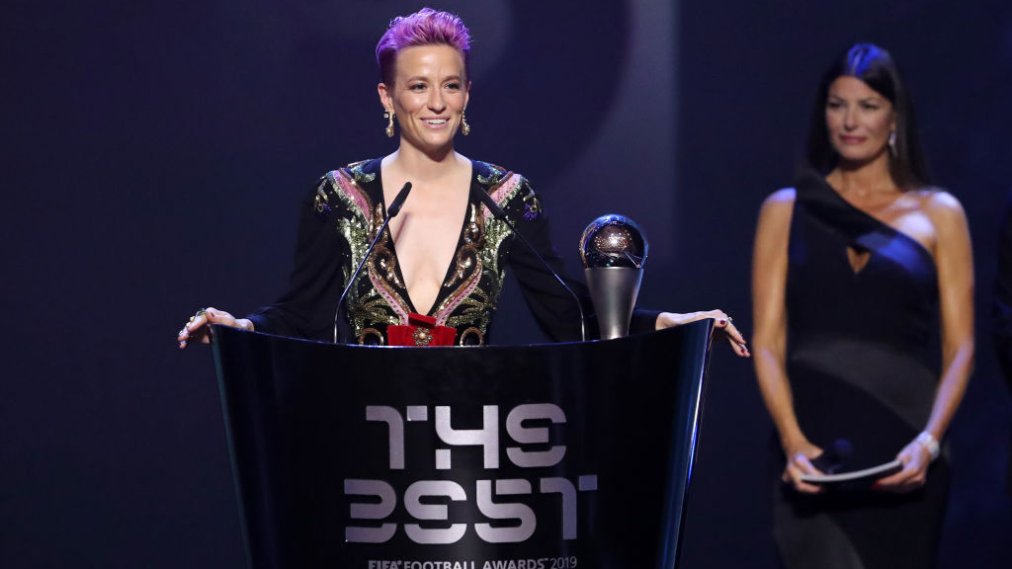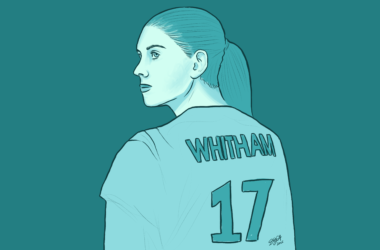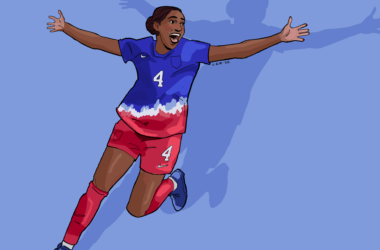US Women’s National Soccer Team (USWNT) star forward Megan Rapinoe accepted Glamour’s Woman of the Year award on Nov. 11. The two-time World Cup champion has a hefty collection of awards for accomplishments on the field, but her activism off it is what makes her a true champion.
In September 2016, Rapinoe took a knee during the US national anthem before a National Women’s Soccer League (NWSL) game, becoming one of just a few white American athletes to show solidarity with Colin Kaepenernick’s protest against police brutality and racism in the United States. She has also long been a part of the USWNT’s fight for equal pay: In March 2016, Rapinoe was among five USWNT members to file a complaint to the Equal Employment Opportunities commission, and in March 2019, she and 27 of her teammates filed a lawsuit against the US Soccer Federation, citing institutionalized gender discrimination. Additionally, Rapinoe continues to use her platform to speak out against homophobia and transphobia in both sports and society, working with groups like the Gay, Lesbian, & Straight Education Network (GLSEN) and Athlete Ally.
Many female athletes are thrust into an activist role because of the systemic sexism prevalent in sports, while their male counterparts have the privilege of being able to focus solely on their athletic careers. Rapinoe, however, recognizes that she cannot just advocate for gender or queer issues, with which she has personal experience. Oppression is intersectional, and while she may experience many barriers, she also benefits from certain privileges.
In her acceptance speech at the 2019 Woman of the Year awards ceremony, Rapinoe was humble and emotional. She thanked Glamour and recognized the diversity of women receiving this year’s award. Early on, she acknowledged Kaepernick’s role in her rise to fame through her activism, noting that she would not be the activist she is today without him.
“While I’m enjoying all of this unprecedented, and, frankly, a little bit uncomfortable, attention and personal success […], Colin Kaepernick is still effectively banned from the NFL for kneeling during the national anthem in protest of known and systematic police brutality against people of colour, known and systematic racial injustice, and known and systematic white supremacy,” Rapinoe said. “[…] It would be a slap in the face to Colin, and to so many other faces, not to acknowledge, and for me personally, [not] to work relentlessly to dismantle that system that benefits some [to] the detriment of others and, frankly, is quite literally tearing us apart in this country.”
Rapinoe consistently recognizes her privilege and uses her platform to give power to marginalized voices. She could have spent the bulk of her speech addressing her lawsuit and the issues female soccer players face; she could have spoken about queer issues and promoted her own activist work; she could have brought up Donald Trump’s Twitter attack against her during the World Cup and criticized the very real and dangerous consequences of his words and actions. These are all important issues, and they are issues that affect her personally. However, Rapinoe used her acceptance speech to share her platform.
“I’m not going to act like it wasn’t Colin Kaepernick, Tarana Burke and the #MeToo movement, Patrisse Cullors, Alicia Garza, and Opal Tometi of Black Lives Matter, the women of Time’s Up, Harvey Milk, Gloria Steinem, Audre Lorde, Trayvon Martin, Sandra Bland, and the injustices that so many others face that have put me in this very position,” Rapinoe said. “And I’m not going to act like my whiteness has nothing to do with me standing before you now.”
White athletes—and white people—would do well to follow Rapinoe’s lead by sharing their platforms to provide room for the voices of marginalized individuals.
“We’ve got to switch the game up,” Rapinoe said. “Caring is cool. Lending your platform to others is cool. Sharing your knowledge and your success and your influence and your power is cool. Giving all the fucks is cool. Doing more is cool.”









